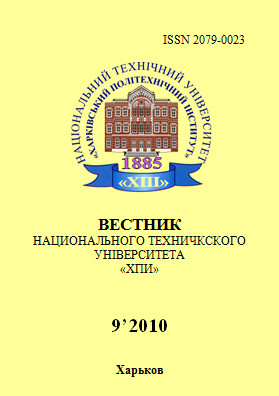Модели управления качеством обработки требований к программному обеспечению
DOI:
https://doi.org/10.20998/%25xAbstract
В статье предлагается подход к управлению качеством обработки требований к программному обеспечению, который основывается на системном подходе и стандартах ISO. Выделены цели функционирования процесса анализа и обработки требований, рассмотрены его основные свойства, особенности взаимодействия с другими процессами жизненного цикла программных систем. Предложена концепция управления качеством входной, выходной информацией и самим процессом анализа и обработки требований.References
Ф.И. Андон, Г.И. Коваль, Т.М. Коротун, Е.М. Лаврищева, В.Ю. Суслов. Основы инженерии качества программных систем 2 изд. перераб. и доп. – Киев: Академпериодика, 2007.
ISO/IEC 12207:2008 System and software engineering – Software life cycle processes.
ISO/IEC 15288:2008 Systems and software engineering — System life cycle processes.
W. Edwards Deming. Out of the Crisis. – Cambridge: MIT Press, Center for Advanced Engineering Study, 1986.
V. Basili, G. Caldiera. Improve Software Quality by Reusing Knowledge and Experience, Sloan Management Review, MIT Press, vol. 37(1), 1995 – p. 55-64.
S. Biffl, A. Aurum, B. Boehm, H. Erdogmus, P. Grünbacher. Value-Based Software Engineering. – Berlin: Springer-Verlag Berlin Heidelberg, 2006.
R.Kazman, M.Klein, P.Clemens. ATAM: Method of Architecture Evaluation. Technical Report// CMU/SEI-2000-TR-004, CMU, 2000.
M.Svahnberg, C.Wholin, L.Lundber. A Quality-Driven Decision-Support Method for Identifying Software// Int. Journal of Software Engineering and Knowledge Engineering, vol. 13(5), 2003 – p. 547-573.
R. Ocker, S. R. Hiltz, M. Turoff, J. Fjermestad. The effects of distributed group support and process structuring on software requirements development teams: results on creativity and quality// Journal of Management Information Systems, vol. 12(3), December 1995 – p. 127–153.
L. Liu, E. Yu, J. Mylopoulos. Security and privacy requirements analysis within a social setting// Requirements Engineering Conference, 2003. Proceedings. 11th IEEE International – p. 151-161.
N.A.M. Maiden, G. Rugg. ACRE: selecting methods for requirements acquisition// Software Engineering Journal, vol. 11(3), May 1996 – p. 183-192.
Th. Erl. Service-Oriented Architecture: Concepts, Technology, and Design. – NJ: Pearson Education, 2005.
M. Wheske. Business Process Management. Concepts, Languages, Architectures. – Berlin: Springer-Verlag Berlin Heidelberg, 2007.
Д. Грязнов. Система управления бизнес-процессами как элемент процессного подхода к управлению бизнесом// Intelligent Enterprise, №4, 2008 – с. 12-15.
A.F. Harmsen. Situational Method Engineering// Doctoral dissertation. – Twente: University of Twente, 1997.
S. Brinkkemper, I. van de Weerd, M. Saeki, J. Versendaal. Process Improvement in Requirements Management: A Method Engineering Approach// Requirements Engineering Foundation for Software Quality. – Berlin: Springer-Verlag Berlin Heidelberg, 2008 – p. 6-22.
J. Ralyté, C. Rolland. An Assembly Process Model for Method Engineering// Advanced Information Systems Engineering. – Berlin: Springer-Verlag Berlin Heidelberg, 2001 – p. 267-283.
J. E. Burge, J. M. Carroll, R. McCall, I. Mistrik. Rationale-Based Software Engineering. – Berlin: Springer-Verlag Berlin Heidelberg, 2008.
St. H. Kan. Metrics and Models in Software Quality Engineering, Second Edition. – Boston: Pearson Education, 2003.
Kh. El Emam. The ROI from software quality. – Boca Raton, FL: Auerbach Publications Taylor & Francis Group, 2005.
J. Karlsson, K. Ryan. A cost-value approach for prioritizing requirements// IEEE Software, vol. 14(5), 1997 – p. 67-74.
Bj. Regnell, M. Höst, J. Natt, P. Beremark,Th. Hjelm. An Industrial Case Study on Distributed Prioritisation in Market-Driven Requirements Engineering for Packaged Software// Requirements Engineering, Springer-Verlag London Limited, vol. 6 (1), 2001 – p. 51-62.
Downloads
Published
How to Cite
Issue
Section
License
Copyright (c) 2015 Вестник Национального технического университета "ХПИ". Серия: Системный анализ, управление и информационные технологииAuthors who publish with this journal agree to the following terms:
- Authors retain copyright and grant the journal right of first publication with the work simultaneously licensed under a Creative Commons Attribution License that allows others to share the work with an acknowledgement of the work's authorship and initial publication in this journal.
- Authors are able to enter into separate, additional contractual arrangements for the non-exclusive distribution of the journal's published version of the work (e.g., post it to an institutional repository or publish it in a book), with an acknowledgement of its initial publication in this journal.
- Authors are permitted and encouraged to post their work online (e.g., in institutional repositories or on their website) prior to and during the submission process, as it can lead to productive exchanges, as well as earlier and greater citation of published work (See The Effect of Open Access).

